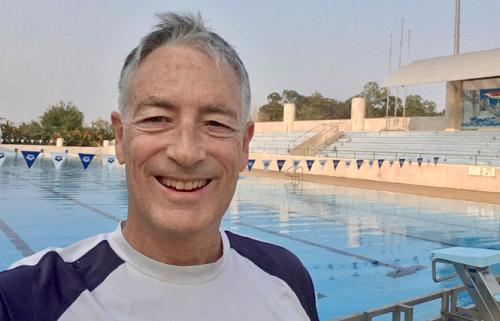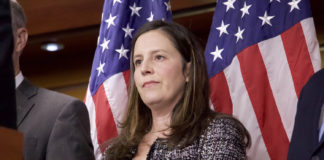Rick Peterson, a gay man and a former co-president of the Federation of Gay Games, died August 15 after he was pulled from the water while swimming in Lake Washington in Seattle. He was 71.
Thomas DeVera, Mr. Peterson’s life partner, wrote in an email that Mr. Peterson was on his 85th mile swim this summer, with his orange swim buoy strapped to his waist. He most likely experienced a heart arrhythmia, causing him to lose consciousness and later asphyxiate, according to a medical exam, DeVera wrote.
Mr. Peterson, a longtime Seattle resident, served as an inaugural co-president of FGG after its transition from San Francisco Arts and Athletics, beginning in 1989, until 1994. He was also an Honorary Life Member of the federation for his contributions and service.
During an August 29 Zoom call, DeVera said that he met Mr. Peterson 21 years ago and they became partners in December 2001.
“He already lived a rich life,” DeVera said. “He inspired so many people and it goes beyond his work with the Federation of Gay Games and swimming at large. Rick gave time to the AIDS community. Rick ran an advertising agency that he started after 9/11.”
Mr. Peterson, along with business partner, Tom Scherer, founded Hydrogen, a Seattle-based ad agency, in September 2001. Both founders believed that simplicity was key to creating powerful advertising and marketing solutions, hence, they named the agency after the simplest element in the universe, according to Mr. Peterson’s biography. As Hydrogen’s president, Mr. Peterson’s steady hand helped guide the agency through economic ebbs and flows during its 21-year history. Although Mr. Peterson retired from Hydrogen in 2017, he continued his support to help assure its success moving forward.
Julie Averill, a lesbian, was a longtime friend of Mr. Peterson’s and joined DeVera on the Zoom call with the Bay Area Reporter. She said that she met Mr. Peterson when they worked together at a small company, Fine.com (now Aris Corporation) many years ago in Seattle. Mr. Peterson served as creative director, she said.
“We formed a very close friendship that lasted 25 years,” said Averill.
Dr. Bob Wood was also on the Zoom call. A former director of the HIV/AIDS program for King County in Washington, which includes Seattle, Wood said his friendship with Mr. Peterson went back to the late 1970s. When the AIDS epidemic started, the county health department recruited him, explained Wood, a gay man, who mostly had seen gay patients at his private practice.
Wood said that he and Mr. Peterson were involved with the Dorian Group, an early gay rights organization in the Pacific Northwest, and they served on its membership committee together.
“He was very reluctant to talk about himself,” Wood said.
Long before the Gay Games, Mr. Peterson did reside in San Francisco after he finished college, in about 1973, Wood said. By 1977, he was back in Seattle.
Gay Games
It was Mr. Peterson’s involvement with Gay Games that is remembered by many San Francisco LGBTQ athletes and others involved with the quadrennial sports competition.
Most recently, Mr. Peterson was involved with Gay Games 11 Hong Kong. It was supposed to have been held this year but was postponed to 2023 due to the COVID pandemic. (Guadalajara, Mexico will co-host Gay Games 11 next year.) Dennis Philipse, founder and former leader of the Gay Games 11 Hong Kong team, wrote in an email that Mr. Peterson joined its partnership development team in 2018 and worked “passionately” to get sponsors.
“After the first couple of calls with him, I immediately felt his amazing passion, energy, and experience for LGBTQ+ sports and the community,” Philipse wrote. “He helped us to get Marriott, Google, and Lululemon as anchor sponsors despite the Hong Kong COVID and political situation.
“I enjoyed working with Rick, as it was always fun, lots of energy, and he always felt like a mentor to me,” Philipse added. “I’m grateful for his friendship, and all he has done, seen, and, more importantly, unseen for our community.”
Christof Wittig, a gay man living in San Francisco, is also involved with the Gay Games and praised Mr. Peterson’s success in helping secure sponsors.
“Rick was instrumental in driving the efforts to increase commercial sponsorship funding for the Gay Games 11 in Hong Kong, given the lack of financial support from the government there,” Wittig, director of fundraising for the event, wrote in an email. “This resulted in getting prolific sponsors such as Marriott Bonvoy, Google YouTube, Lululemon, Standard Chartered, and Gilead behind the idea that the world of LGBTQ+ people can continue to be changed for the better, also in new regions like Asia, through the sports and arts programs of the Gay Games since its first edition in San Francisco in 1982.”
Derek Liecty, a longtime Gay Games participant who lives in the East Bay — the 90-year-old said that he’s taken part in every event in bicycling but has had to step back due to suffering an injury — fondly recalled Mr. Peterson’s involvement.
“I knew him very, very well,” Liecty said in a phone interview. “Rick Peterson was the calming force of the federation through all its travails. He was intelligent, resourceful, and non-controversial in the main.”
Liecty said he believed Mr. Peterson’s lasting contribution will be “the fact that although not fulfilled, he was on the verge of arranging major corporate sponsorships for the Gay Games at the time of his death.” He noted Mr. Peterson’s involvement in securing sponsorships for the Hong Kong Gay Games, but said that the federation as a whole has not secured long-term major financial support.
“I’m hoping someone will be able to pick up where he left off,” Liecty added. “I just wish we had more like him in the federation. On the other hand, I think it’s a miracle this nonprofit has carried on for 40 years.”
In an essay Mr. Peterson wrote for FGG for its 40th anniversary this year, he stated that he learned of Gay Games — the first was in San Francisco in 1982 — from his friend Dana Cox, who had returned to Seattle from the event, where he’d won two gold medals in swimming.
“Actually, at that time in 1982, I had no perception of any opportunity to participate in Seattle’s emerging gay community as a swimmer or athlete (other than bowling and softball at the time, plus a little volleyball), let alone anything as fantastic-sounding as what Dana described — entering Kezar Stadium along with about 1,500 other LGBTQ+ athletes and artists at the Opening Ceremonies of Gay Games and being serenaded by Tina Turner!” Mr. Peterson wrote. “I think Dana was the only swimmer from Seattle. I was fascinated.”
Mr. Peterson, an avid and accomplished swimmer from the age of 10 until he finished college, in 1984 decided to form a gay swim team in Seattle with Cox and another friend, John Horman. “We called ourselves the Emerald Orca Swim Club (Seattle is nicknamed the Emerald City for being surrounded by evergreen forests and mountains). I became co-captain and shortly thereafter Allison Beezer joined me as co-captain — a wonderful woman involved with guiding clients on socially-responsible investing and financial planning,” Mr. Peterson wrote. “One of our biggest first goals was to organize swimmers and divers from Seattle to participate in Gay Games II in San Francisco in 1986. Dana would no longer be the only Gay Games swimmer from Seattle!
“To get ready, we needed to not only practice swimming, we needed coaching, we needed pool access, we needed to practice actually swimming in competitions, diving off the starter blocks, having legal turns at the end of each pool length, not getting disqualified for touching the pool end with one hand versus two hands simultaneously as required by U.S. Masters Swimming rules for breaststroke, etc.,” he added.
He explained the long process of getting the Orca Swim Club to hold what he believed was the first USMS-sanctioned LGBTQ+ swim meet in the country in 1987 after Gay Games II.
“That began a dramatic new chapter in my Gay Games adventures. Including, during the five years I served as FGG co-president, the thrill of seeing Gay Games grow from 3,500 participants at Gay Games II in San Francisco in 1986, to 7,500 participants at Gay Games III in Vancouver in 1990, to 11,500 participants in 1994 at Gay Games IV in New York City,” Mr. Peterson wrote. “And along the way, breaking barriers and celebrating the development of sport and culture groups — creating exciting opportunities for hundreds of thousands of LGBTQ+ athletes and artists worldwide to participate, be included, and reach for personal bests.”
Other charitable work
Wood said that Mr. Peterson served on the board of the Northwest AIDS Foundation (now part of Lifelong) and was president for two years.
Wood said that part of the reason he got involved in Gay Games was to help people become more physically active.
Mr. Peterson was born August 6, 1951. He was a native Northwesterner — having grown up in Bellingham, Washington — and is both a Cougar and a Husky (with a Bachelor of Arts in communications from the University of Washington and a Bachelor of Science in zoology from Washington State University). He was also fast. In 1999, Mr. Peterson set three U.S. Masters Swimming National Top 10 times in the 50 & 100m freestyle and the 100m breaststroke.
In addition to his partner DeVera, Mr. Peterson is survived by his brother and sister-in-law, Greg and Leslie Peterson; his nephew Matthew Maher Peterson and his niece Ashley Walker; and Mr. Peterson’s large community of friends, including the international swimming community.
Help keep the Bay Area Reporter going in these tough times. To support local, independent, LGBTQ journalism, consider becoming a BAR member.







